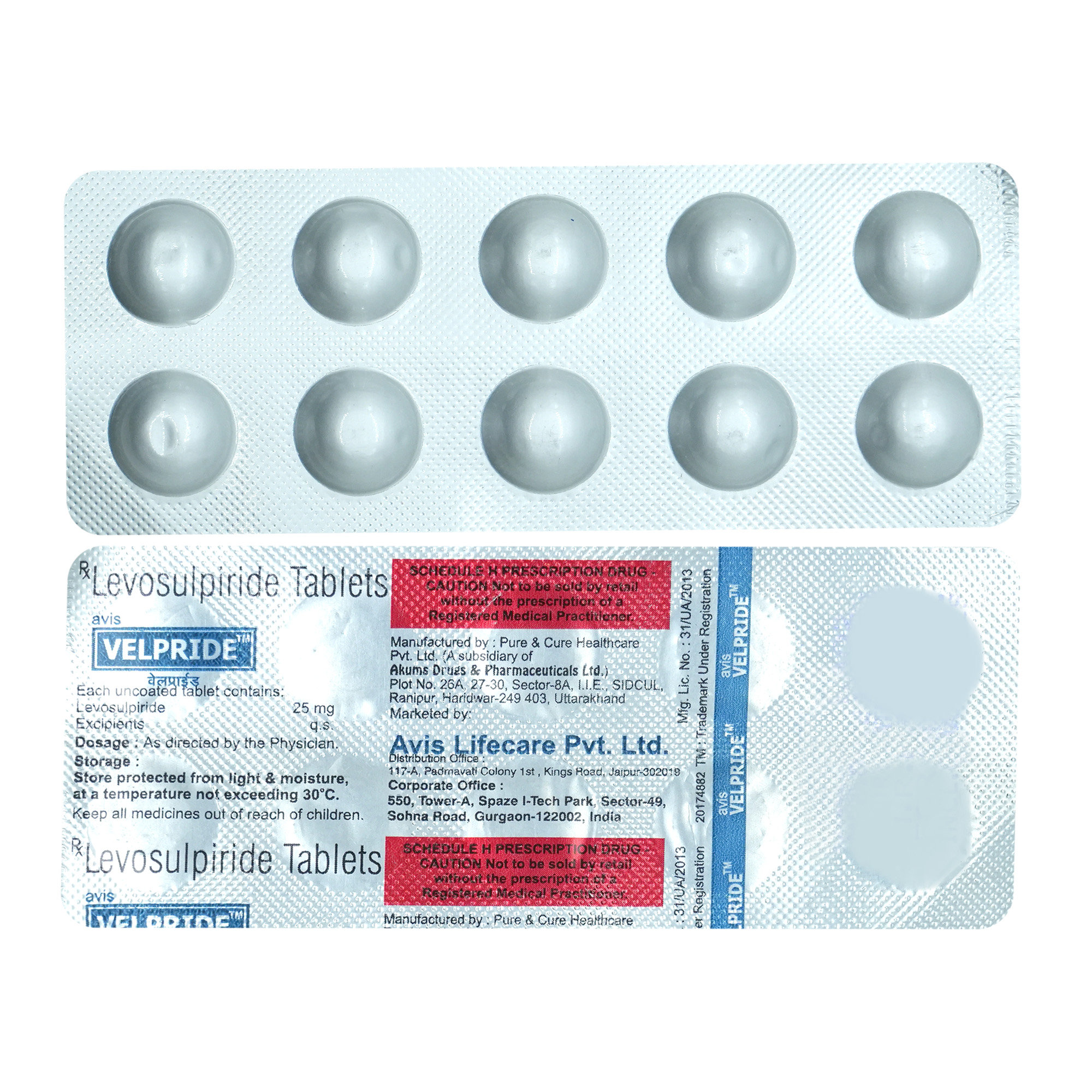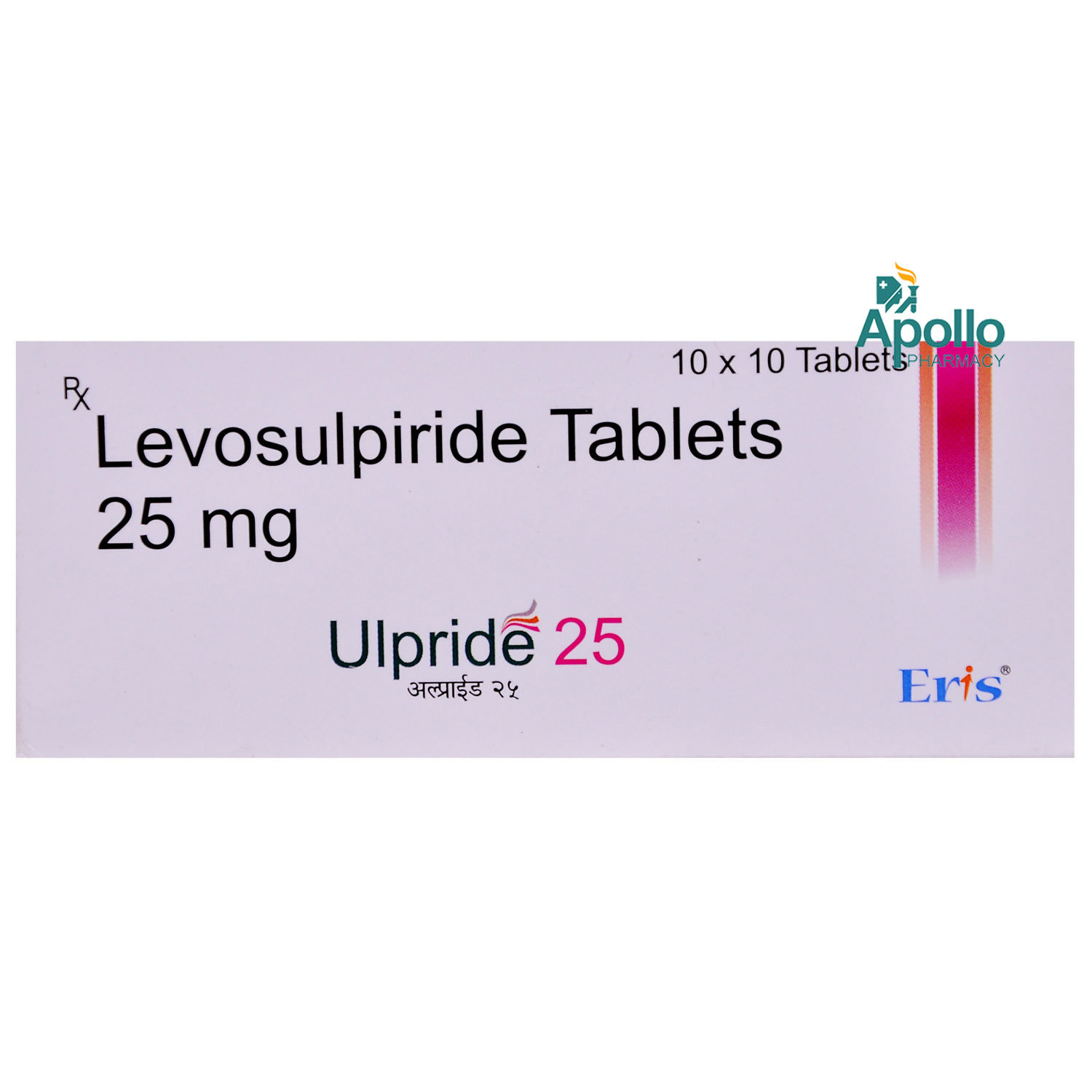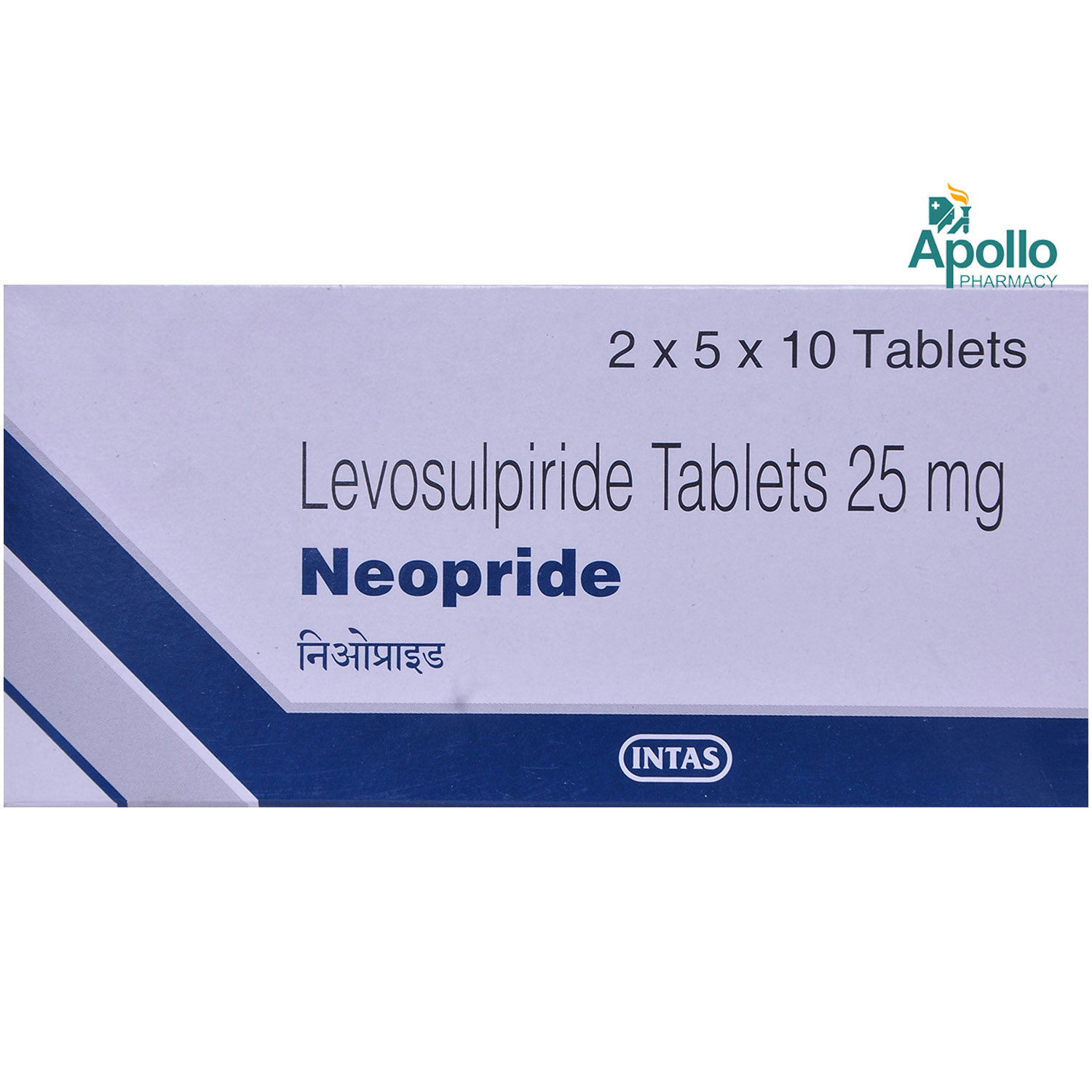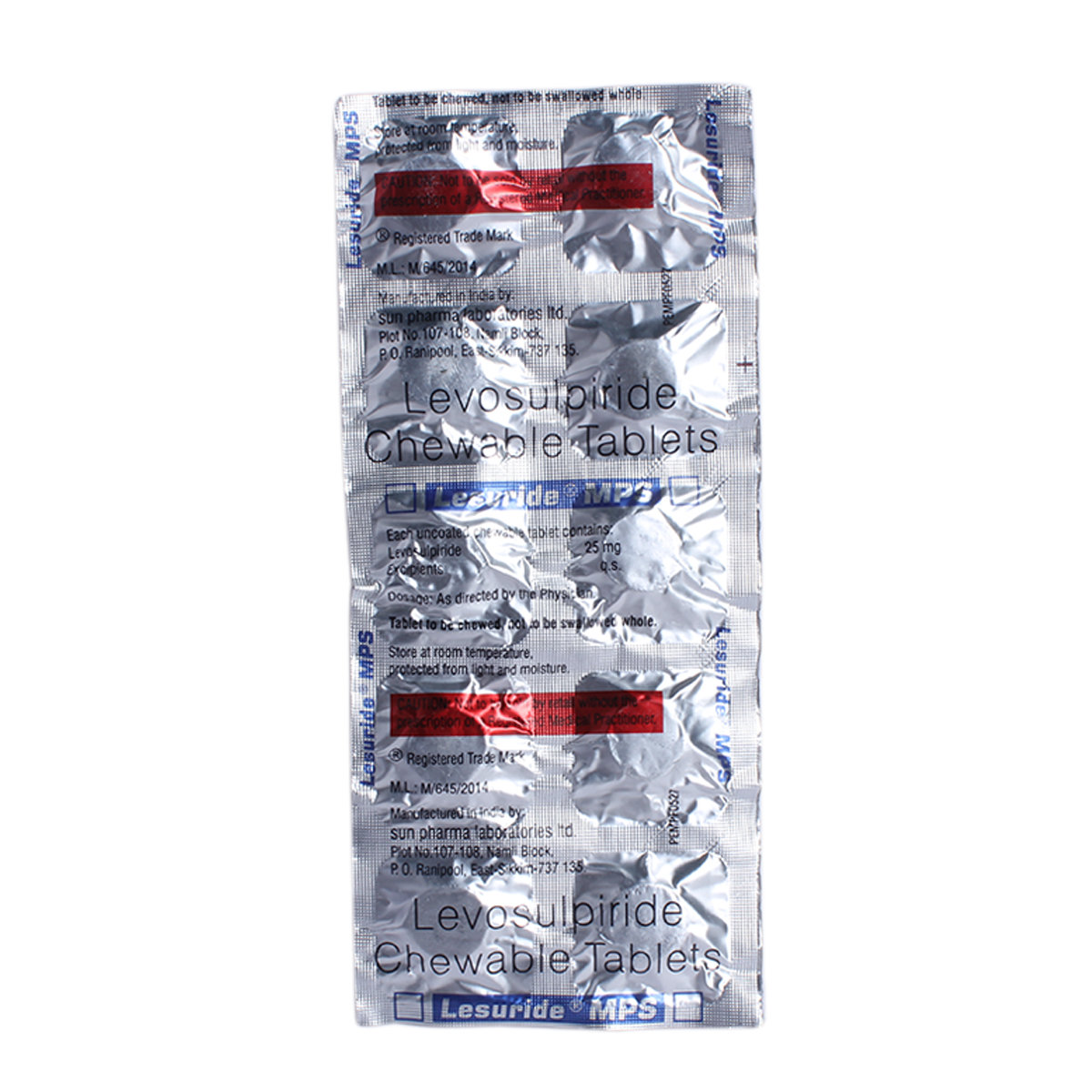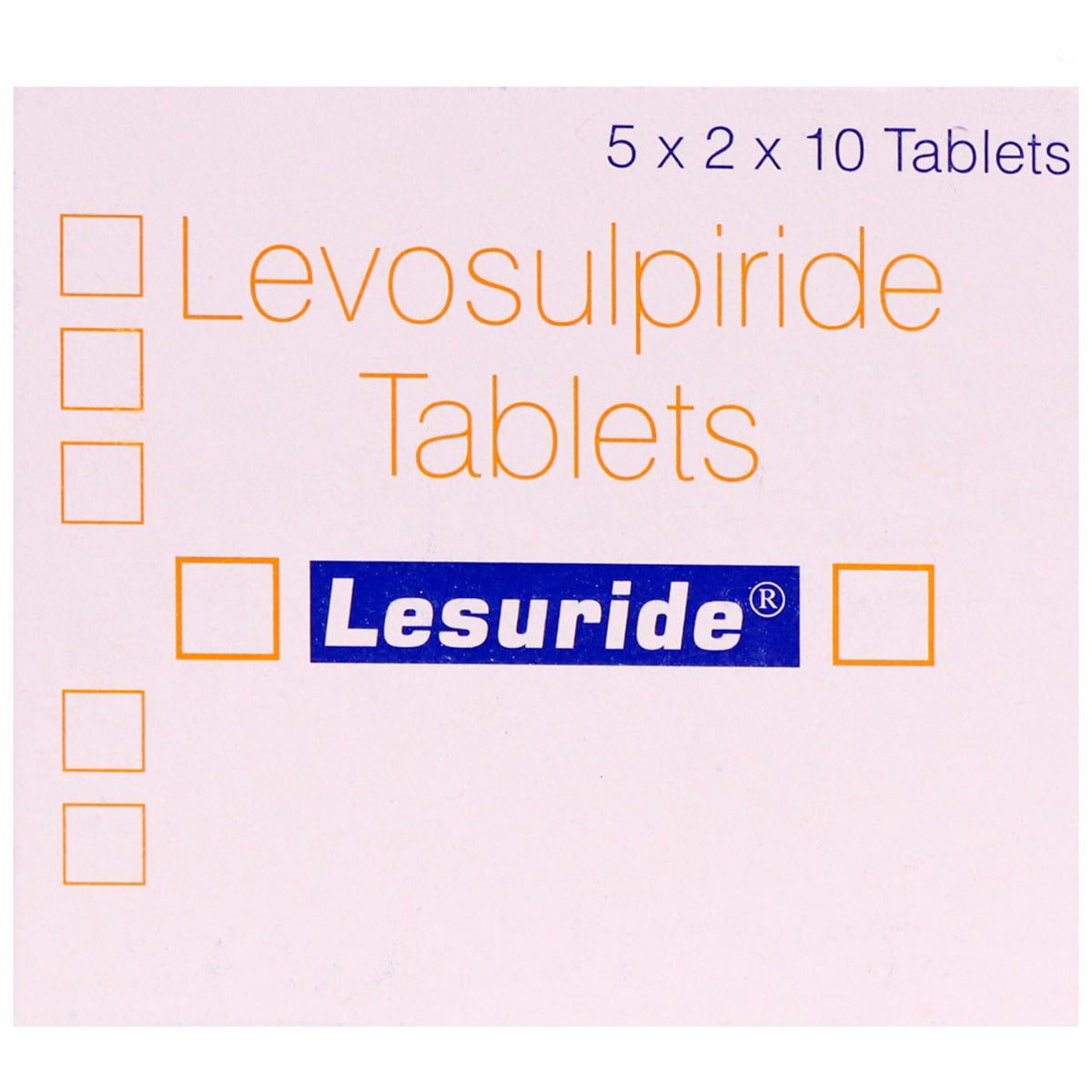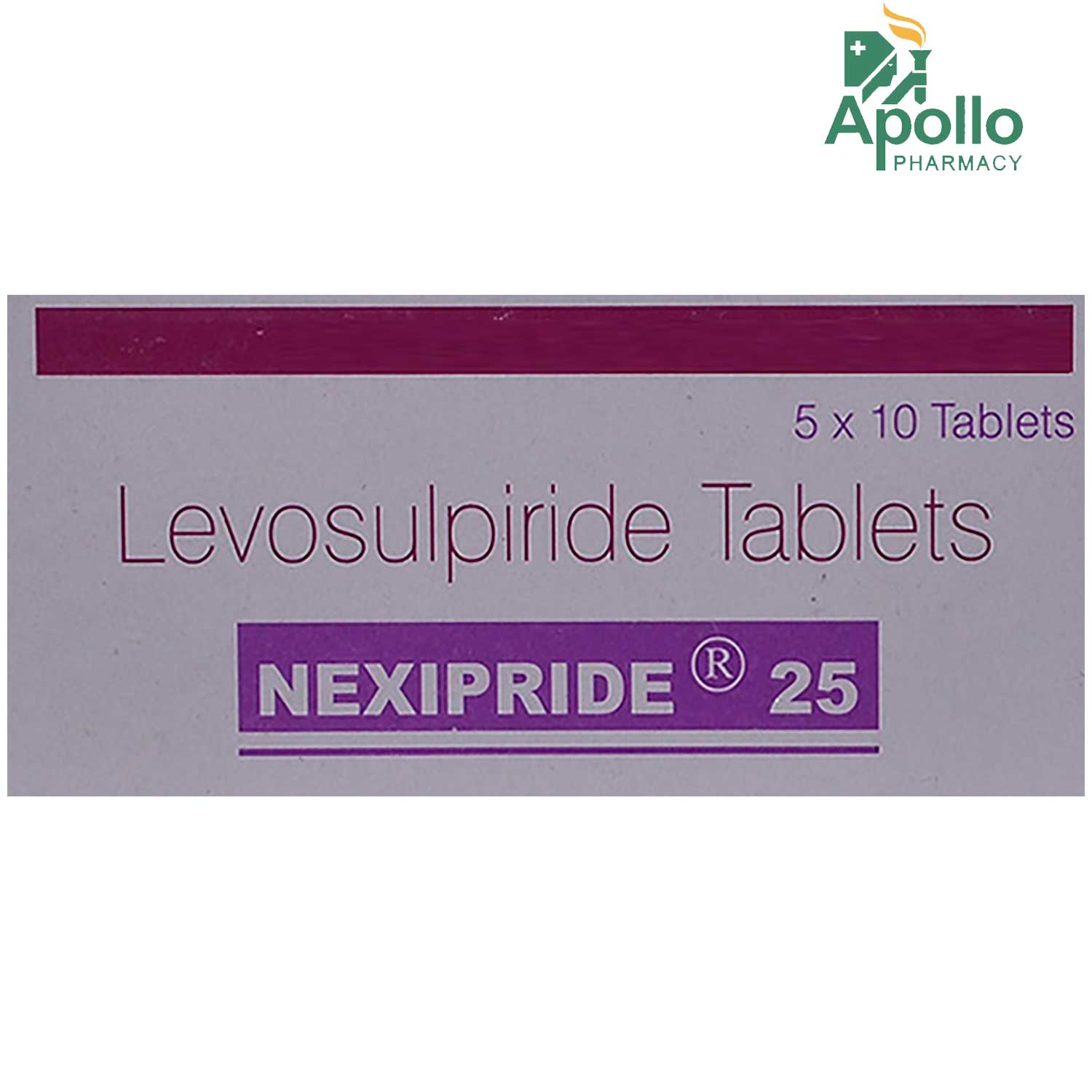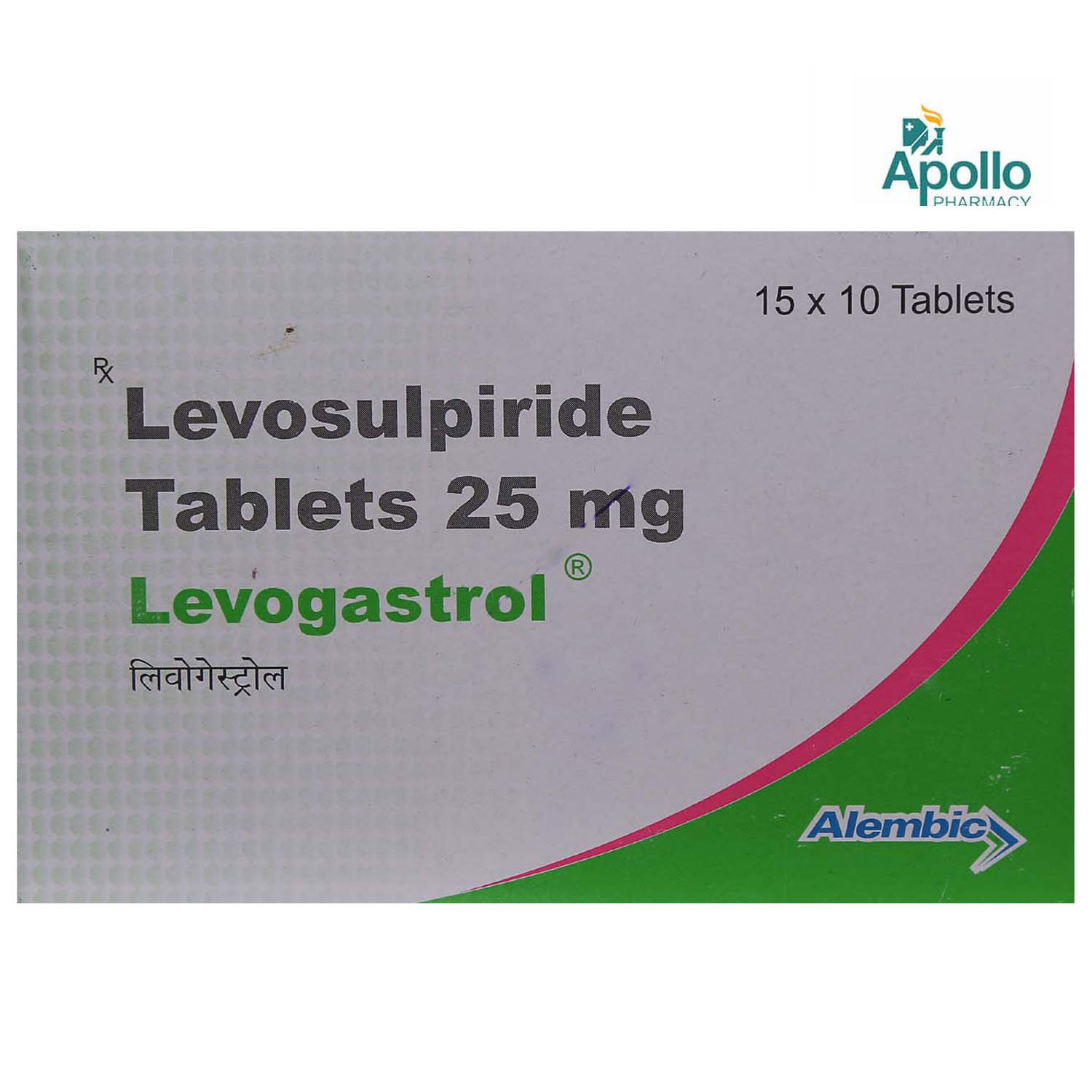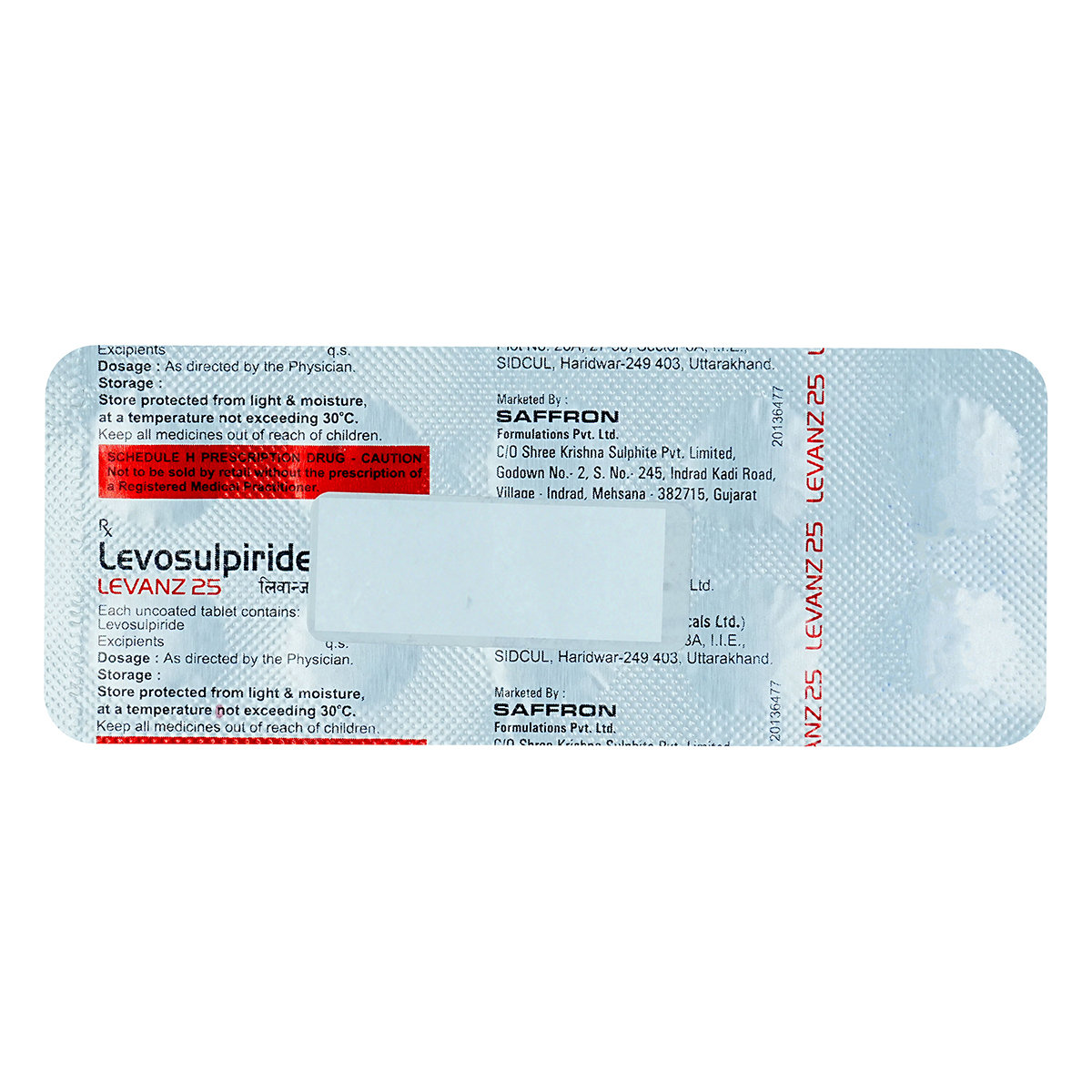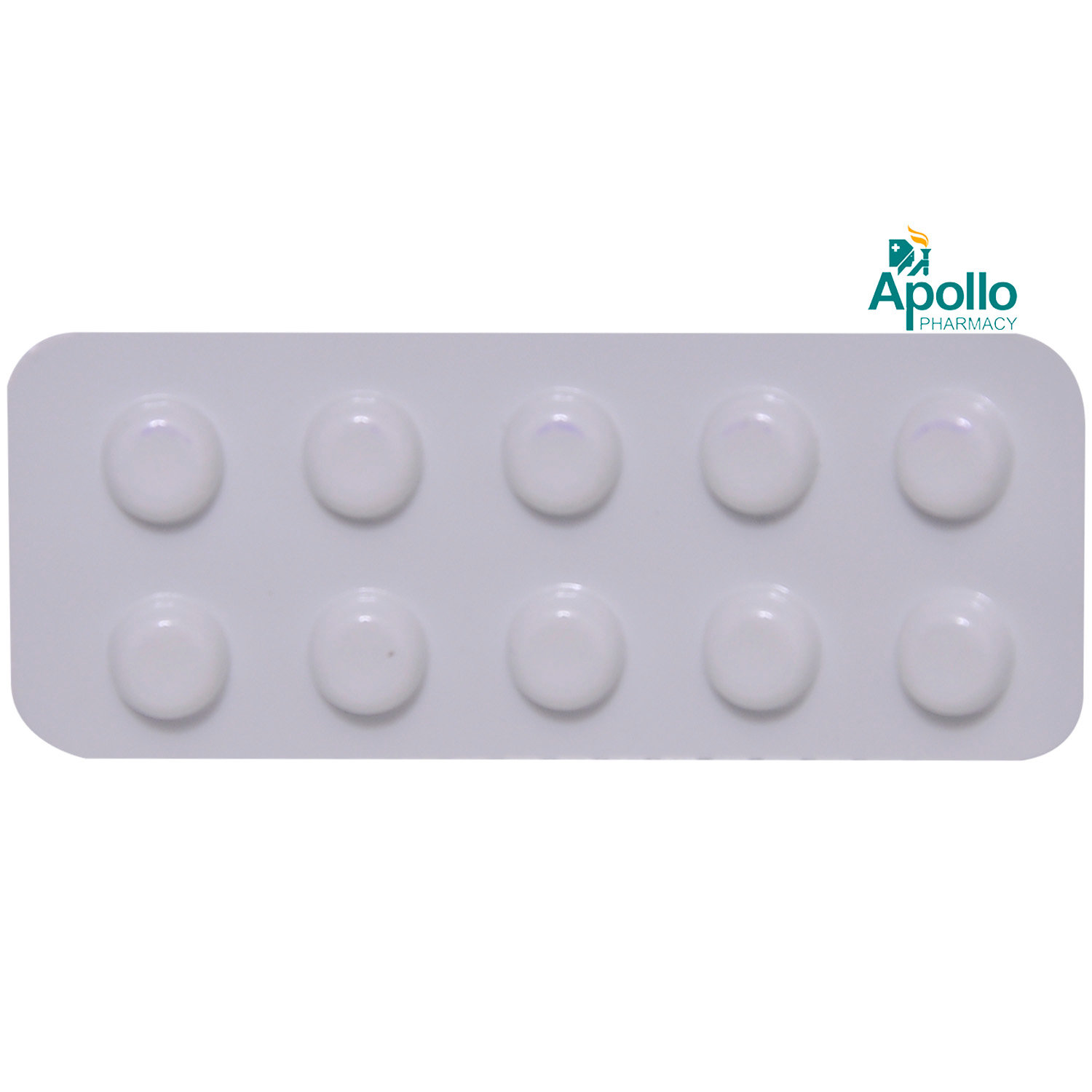Levipride 25 mg Tablet
MRP ₹84
(Inclusive of all Taxes)
₹12.6 Cashback (15%)
know your delivery time
Provide Delivery Location
Composition :
Manufacturer/Marketer :
Consume Type :
Expires on or after :
Return Policy :

Secure Payment

Trusted by 8 Crore Indians

Genuine Products
Therapeutic Class
Country of origin
Manufacturer/Marketer address
Author Details
We provide you with authentic, trustworthy and relevant information
FAQs
Disclaimer
Alcohol
Safe if prescribed
Avoid consumption of alcohol while taking Levipride 25 mg Tablet to prevent unpleasant side effects.
Pregnancy
Consult your doctor
Avoid taking Levipride 25 mg Tablet if you are pregnant. Please consult your doctor if you have any concerns regarding this.
Breast Feeding
Consult your doctor
Avoid breastfeeding while on treatment with Levipride 25 mg Tablet . Consult your doctor if you have any concerns.
Driving
Safe if prescribed
Levipride 25 mg Tablet may cause dizziness. Do not drive or operate machinery unless you are alert.
Liver
Consult your doctor
Consult your doctor before taking Levipride 25 mg Tablet if you have a liver impairment or liver problems.
Kidney
Consult your doctor
Consult your doctor before taking Levipride 25 mg Tablet if you have kidney impairment or kidney problems.
Children
Safe if prescribed
Levipride 25 mg Tablet is not recommended for children as the safety and effectiveness were not established.
Reference
- http://mri.cts-mrp.eu/download/IT_H_0367_001_FinalPL.pdf
- https://www.mims.com/india/drug/info/levosulpiride?type=full&mtype=generic
- https://file.wuxuwang.com/hma/IT_H_0367_001_FinalPL.pdf
- http://www.xenonpharma.com.pk/images/images/big/de638_Perk%20Tabs.%20Leaflet.pdf
- https://medipharlabs.com/attachments/article/231/Dislep%20insert.pdf
About Levipride 25 mg Tablet
Levipride 25 mg Tablet belongs to a group of medicines called 'prokinetics, psycholeptic and antipsychotics' used to treat gastroesophageal reflux disease (GERD), irritable bowel syndrome (IBS), dyspepsia (indigestion). Additionally, Levipride 25 mg Tablet is also used to treat psychotic disorders like somatic symptom disorders and chronic schizophrenia with negative symptoms.
Levipride 25 mg Tablet contains 'Levosulpiride' which increases the pressure of the inferior oesophagal (food pipe) sphincter, thereby preventing the backflow of food and acid from the stomach into the mouth. Levipride 25 mg Tablet increases gastrointestinal motility without disrupting their rhythm, thereby helps in treating indigestion. Levipride 25 mg Tablet works by blocking the effects of chemical receptors in the brain such as dopamine, thereby helps in improving mood, behaviour and thoughts.
You are advised to take Levipride 25 mg Tablet for as long as your doctor has prescribed it for you depending on your medical condition. In some cases, you may experience certain common side-effects such as dizziness, sleepiness, weakness, and vertigo (spinning sensation). Most of these side-effects do not require medical attention and will resolve gradually over time. However, you are advised to talk to your doctor if you experience these side-effects persistently.
Do not take Levipride 25 mg Tablet if you are pregnant or breastfeeding. Levipride 25 mg Tablet may cause dizziness, so drive only if you are alert. Levipride 25 mg Tablet is not recommended for children as safety has not been established. Avoid consuming alcohol along with Levipride 25 mg Tablet as it could lead to unpleasant side-effects. Keep your doctor informed about your health condition and medicines to rule out any side-effects/interactions.
Uses of Levipride 25 mg Tablet
Medicinal Benefits Mweb
Key Benefits
Levipride 25 mg Tablet belongs to a group of medicines called 'prokinetics, psycholeptic and antipsychotics' used to treat gastro-oesophagal reflux disease (GERD), irritable bowel syndrome (IBS), dyspepsia (indigestion). Levipride 25 mg Tablet increases the pressure of the inferior oesophagal sphincter, thereby preventing the backflow of food and acid from the stomach into the mouth. This helps in treating gastro-oesophagal acid reflux (GERD). Levipride 25 mg Tablet increases gastrointestinal motility by enhancing the strength of contractions without disrupting their rhythm, thereby helps in treating indigestion. Additionally, Levipride 25 mg Tablet is also used to treat somatic symptom disorders and chronic schizophrenia with negative symptoms. Levipride 25 mg Tablet works by blocking the effects of chemical receptors in the brain such as dopamine, thereby helps in improving mood, behaviour and thoughts.
Directions for Use
Side Effects of Levipride 25 mg Tablet
- Dizziness
- Sleepiness
- Weakness
- Vertigo (spinning sensation)
Drug Warnings
Do not take Levipride 25 mg Tablet if you are allergic to any of its contents; if you have mania, epilepsy, high blood pressure, or breast cancer. Talk to your doctor before taking Levipride 25 mg Tablet if you have/had gastrointestinal bleeding, blockage/perforations, dementia, heart problems, blood clot problems, or if you are treated with other neuroleptic medicines. Do not take Levipride 25 mg Tablet if you are pregnant or breastfeeding. Levipride 25 mg Tablet may cause dizziness, so drive only if you are alert. Levipride 25 mg Tablet is not recommended for children as safety has not been established. Keep your doctor informed about your health condition and medicines to rule out any side-effects.
Drug-Drug Interactions
Drug-Drug Interactions
Login/Sign Up
Drug-Food Interactions
Drug-Food Interactions
Login/Sign Up
Drug-Diseases Interactions
Drug-Diseases Interactions
Login/Sign Up
Drug-Drug Interactions Checker List
- ALUMINUM HYDROXIDE
- MAGNESIUM HYDROXIDE
Habit Forming
Diet & Lifestyle Advise
Acidity & Indigestion:
- Eat smaller meals more often.
- Avoid smoking and alcohol consumption. Alcohol intake leads to increased production of stomach acid, thereby increasing acidity and heartburn.
- Maintain a healthy weight by regular exercising.
- Avoid lying down immediately after eating.
- Avoid tight-fitting clothes.
- Maintain a healthy weight by regular exercising.
- Practise relaxation techniques and avoid stress by doing yoga or meditation.
- Avoid foods such as high-fat food, spicy food, chocolates, citrus fruits, pineapple, tomato, onion, garlic, tea and soda.
- Avoid sitting continuously as it may trigger acidity. Take a break of 5 minutes every hour by doing brisk walking or stretching.
Mood disorder & Schizophrenia:
- Maintain a healthy diet and exercise regularly.
- Regularly attend therapy sessions.
- Perform meditation and yoga.
- Follow a regular sleep pattern.
- Avoid smoking and alcohol consumption.
- Learn about your condition, understand the risk factors and follow the doctor’s treatment plan.
All Substitutes & Brand Comparisons
RX
Out of StockVOLAPRIDE 25MG TABLET
Mankind Pharma Pvt Ltd
₹59.84
(₹5.27 per unit)
30% CHEAPERRX
Velpride 25 mg Tablet 10's
Avis Lifecare Pvt Ltd
₹62.5
(₹5.63 per unit)
25% CHEAPERRX
Levowave Tablet 10's
Brainwave Healthcare Pvt Ltd
₹67.5
(₹6.08 per unit)
19% CHEAPER

Have a query?


_0.jpg?tr=q-85)

